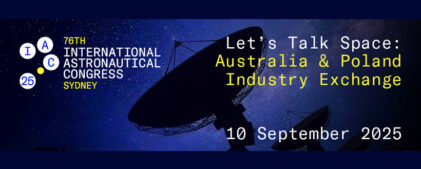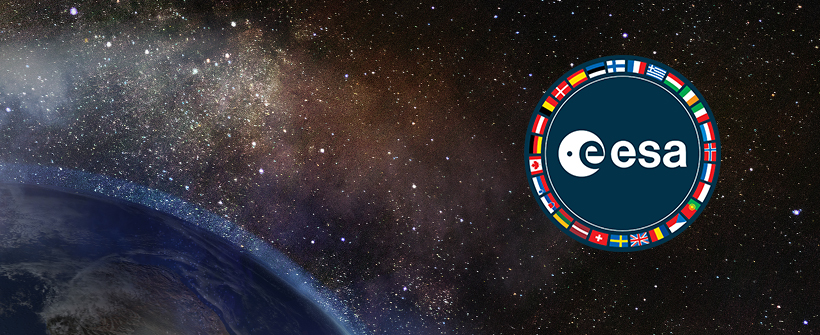Increased participation of Poland in ESA programs, access to research on the International Space Station (ISS), construction of Polish observational satellites, and internships for Poles at ESA – these are the main areas that will be funded through Poland’s increased contribution to the European Space Agency.
Deputy Minister Kamila Król, Undersecretary of State at the Ministry of Economic Development and Technology Republic of Poland, announced at today’s meeting with the space sector about Poland’s increased contribution to the European Space Agency. She emphasized the significance of this new branch of the economy for Poland and indicated how these funds will be utilized.
The information was further elaborated by the President of POLSA, Grzegorz Wrochna, who highlighted the priority areas of this investment.
“The funds contributed to ESA will mostly return to the Polish industry, enabling the development of technology and the creation of competitive products and services. First and foremost, we want to meet our country’s needs in satellite data, as well as satellite telecommunications and navigation. Satellites provide us with communication and navigation, synchronize the movement of trains and airplanes, provide weather and climate information, support modern agriculture, and other sectors of the economy. At the same time, we want to invest in areas that offer the greatest opportunity to capture new segments of the space technology market. The details will be established in negotiations with ESA, with active consultation from the Polish space sector,” said President Wrochna.
The decision to increase funding to ESA is an important step in the implementation of the Polish Space Strategy adopted in 2017. The funds will be allocated to finance five areas of activity:
- The PL-ESA bilateral program for building observational satellites
- The PL-ESA bilateral program for technology development
- Poland’s participation in ESA programs
- Access to research on the International Space Station (ISS)
- Internships for Poles at ESA
Observational satellites, both optical and radar-based, are crucial today not only in crisis situations but also in many areas of modern economy and daily life. They continuously provide farmers with information about crop conditions, droughts, floods, pests, and plant diseases. They allow us to monitor and support the development of our cities, warn about landslides and fire hazards, and provide insights into the state of our rivers and coastal waters.
ESA experts will assist Polish companies in building the first prototypes of satellites, enabling them to independently develop entire constellations and profitable exports to other countries. Data from satellites will contribute to the National Satellite Information System being developed by POLSA, whose pilot version has recently been launched https://nsisplatforma.polsa.gov.pl. This system will grant scientific institutions and companies access to data, and we will all benefit from their products and services based on this data.
Enhancing the competencies of Polish companies is also the primary goal of the dedicated technology development program and increased involvement in ESA programs. This will allow our country to access the latest technologies and provide an opportunity to develop unique competencies related to the practical application of these technologies. Satellite telecommunications, especially secure communication, satellite navigation, and synchronization of devices such as power equipment, trains, and airplanes, represent a market with turnovers in the billions of dollars. The Polish Space Strategy aims for Poland’s space sector to achieve a 3% share in the European market.
Participation in ESA programs also contributes to the most ambitious exploratory missions. Today, Polish scientific institutions and companies provide components for missions searching for signs of life on other planets and their moons, as well as studying the distant universe. Examples of such missions include JUICE, launched last month https://polsa.gov.pl/kalendarz/start-misji-juice/ and EUCLID, which launched last Saturday https://polsa.gov.pl/wydarzenia/misja-euclid-kosmiczny-teleskop-do-poszukiwania-ciemnej-materii-i-ciemnej-energii/.
The increased funds will not only enable the delivery of components but also the construction of complete systems and instruments. This will have significant implications for both Polish science and companies, as they will gain invaluable experience in building space equipment. This, in turn, will translate into space technology-based services and export products.
Technological and research experiments conducted on the International Space Station (ISS) play a crucial role in this regard. These experiments cover a wide range, from basic research to testing new technologies and biotechnological, biological, and medical experiments. Experiments developed by Polish scientists and engineers would be carried out by a Polish astronaut. In addition to the immense scientific and technological value of such research, it would have significant prestige for our country. Details regarding the flight of a Polish astronaut will be disclosed only after an agreement is reached among all parties involved, including international partners.
A complementary program to the above initiatives will be the internship program. Its aim is to educate a group of experts who will contribute to the Polish space sector and facilitate the commercial development of technologies developed in the above-mentioned programs.
The detailed allocation of additional funds will be the subject of consultations with the sector, which commenced with today’s meeting. The specific agreements with ESA are currently being negotiated by the Ministry of Economic Development and Technology* with the support of POLSA. It is expected that the first agreements will be signed in the coming months.
*) https://twitter.com/AschbacherJosef/status/1663555339319656449







 Back
Back




